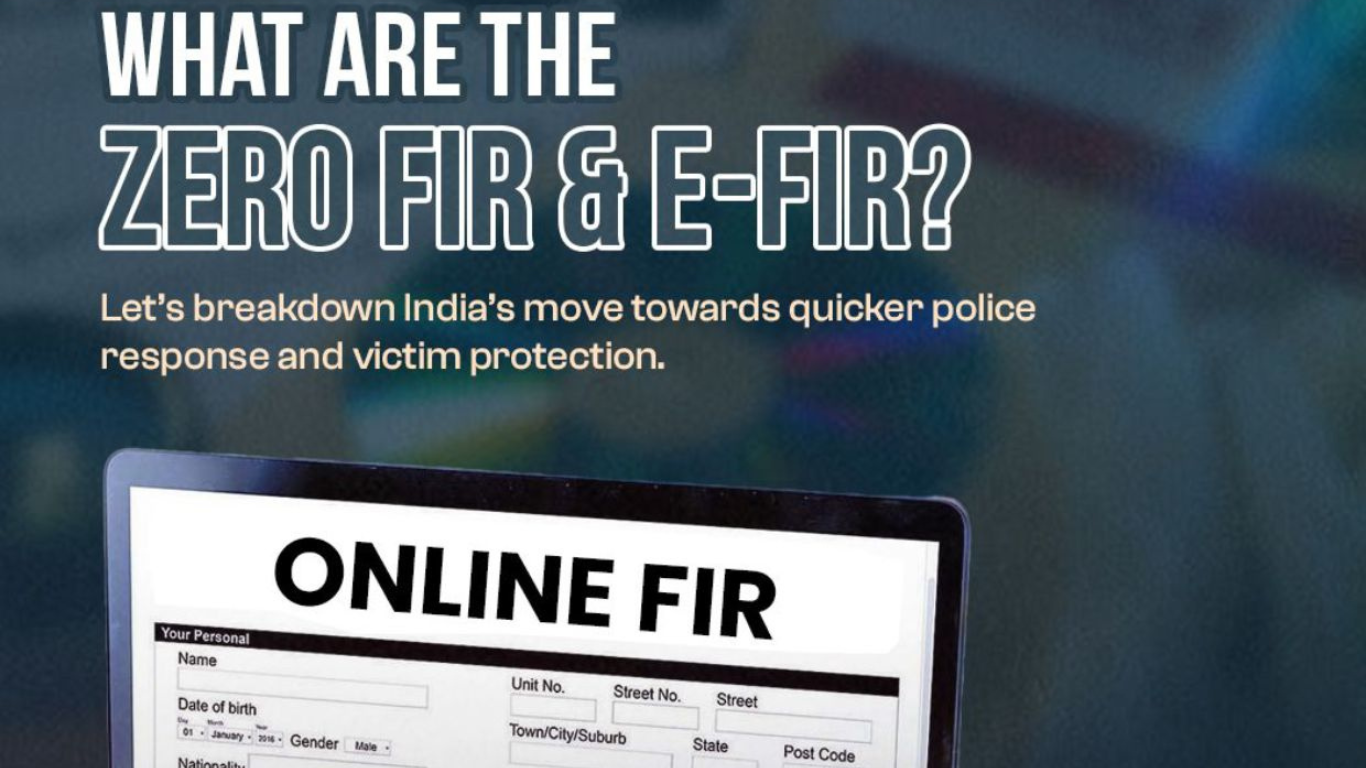
How to file a FIR?
The FIR is a crucial document in India’s criminal justice system. It is filed to initiate the police investigation of a suspected offence. It serves as the official record of the crime or offence reported to the police and is legally required to be filed by the police.
After you file an FIR, the police are notified about the occurrence of an offence. This allows them to take immediate action to arrest the accused, gather evidence, and prevent further harm to the victim(s).
FIR is the first step to bringing the perpetrators to justice and providing relief to victims or aggrieved parties. You can visit the station to file an FIR in the same jurisdiction or file a Zero FIR if the crime was committed in a different jurisdiction. If you are unable to visit a station, you can even file an E-FIR online.
This blog will outline the steps and procedures you need to follow to file an FIR using different methods.
Steps to File an FIR at the Police Station
Visit the Police Station
You must visit the police station in the area where the crime was committed. Do not worry if you are unsure about the jurisdiction. Go to any police station, and they will have to direct you.
Requesting to File an FIR
Inform the concerned officer at the police station about filing an FIR. You must clearly state that you are looking to file an FIR and not just a general complaint. For the most impactful outcome, reach out to the famous criminal lawyers in Bangalore
Give Detailed Information
You must state the correct and accurate details about the crime while mentioning the FIR at the police station. Listed below are some details you need to include in FIR:
Date and time of incident: Mention the exact date and time at which the crime occurred.
Location of Incident: Indicate the place where the crime occurred.
Incident description: Describe the crime incident in detail, including everything relevant to the crime.
Identifying information: Provide identifying details about the persons involved in the crime. This can include physical characteristics, clothing, unique identifiers and more.
Potential witnesses: Mention the names, addresses and phone numbers of the potential witnesses.
Lost property: Give details about any lost property, including its approximate value.
Written Statement
You can either give the information orally and have the officer in charge record it in writing or submit a written statement.
Verify and Sign the Report
After you provide the required information, the police officer will prepare an FIR according to the prescribed format. You must read and verify the details carefully and sign the FIR once you are satisfied.
Request a Copy of the FIR
After you have completed the filing requirements, you must request a copy of your FIR at the police station. This is important for your purposes. You must obtain the FIR, the date of filing, and the name of the police station. These details are important for future reference or legal proceedings if needed.
Follow up
Remember to follow up with the police after filing an FIR to ensure the status of the investigation. If you are not getting a response or believe that no relevant action has been taken, you can contact the Superintendent of Police. Just filing the FIR is not enough; you must ensure that the case is actively pursued.
What’s New About Filing an FIR?
The new Bharatiya Nyaya Sanhita 2023, Bharatiya Nagrik Suraksha Sanhita 2023, and Bharatiya Sakshya Adhiniyam 2023 tried to replace the previous criminal jurisprudence framework in India. With the new additions, these frameworks focused on relaxing the complexities in the Indian justice system.
Filing an E-FIR
In line with the Digital India initiative, every government department in India is digitizing. You do not need to worry about going to specific police stations to file your FIR anymore. They can be filed from the comfort of your home.
The system allows individuals to file FIRs online for certain non-cognizable offences, helping streamline the process and reducing delays for citizens who want to register complaints remotely.
The launch of the E-FIR system was seen as a step toward making the justice system more accessible and user-friendly, especially in a country with a vast and diverse population.
Steps to Follow:
- Visit the official police e-FIR portal or website for your state.
- Provide essential details about the incident, including documents or proof.
- An investigator will carry out initial verification of the e-FIR.
- You will receive a free copy of your FIR.
- The investigating officer will collect evidence, interrogate witnesses and take the necessary steps to solve the case.
Zero FIR
A Zero FIR is typically filed in situations where the crime has occurred outside the jurisdiction of the police station where the complaint is being made. This is especially useful when the FIR is delayed due to jurisdictional issues or when the victim wants to report a crime immediately, regardless of where it occurred.
The primary advantage of a Zero FIR is that it ensures swift case registration. When someone reports a crime, the police are required to register the complaint immediately, regardless of whether the crime occurred in their jurisdiction.
After the FIR is registered, the police are supposed to transfer it to the appropriate police station that has jurisdiction over the area where the crime actually occurred. This ensures that action is taken immediately.
Zero FIR was introduced following a recommendation by the Verma Committee (after the 2012 Delhi gang rape case), which highlighted the need for timely registration of complaints. It is consistent with the broader principle that a victim’s complaint should be heard and addressed without technical delays or jurisdictional issues.
Steps to Follow:
- Visit any nearest police station without concern about the jurisdiction of the place where the crime has occurred. Request to file a Zero FIR.
- The police officer will record your complaint in the Zero FIR Register.
- The officer will provide you with a free copy of the registered Zero FIR. If not, request for a copy.
- The Zero FIR will be sent to the police station with the jurisdiction of the location where the crime happened.
- The receiving station will register the Zero FIR again as a regular FIR.
- The investigating officer will collect evidence, interview witnesses and take the necessary actions to solve a case.
- You will receive regular updates about the investigation.
Wrapping Up!
We covered every relatable aspect of the procedure and legal steps to take for filing an FIR. The filing of an FIR is the first step in the criminal justice process and ensures that victims receive justice. The introduction of the new laws provides relaxation on visiting the police station of the concerned jurisdiction to file an FIR. You can follow the steps mentioned above in this post to file an FIR about the offence. For any challenges that you may come across when filing an FIR, you can seek assistance from Criminal Advocates in Bangalore.




